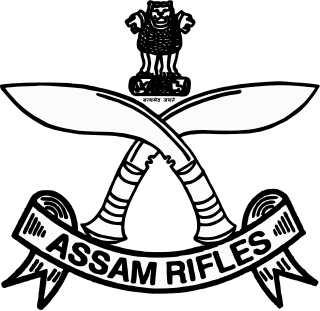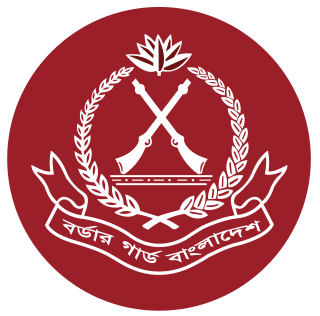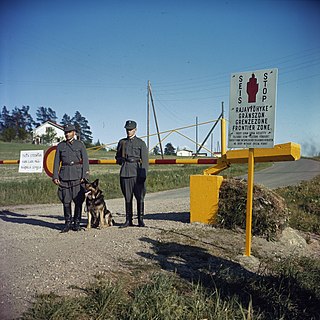Related Research Articles

The Border Security Force (BSF) is India's border guarding organisation at its borders with Pakistan and Bangladesh. It is one of the five Central Armed Police Forces (CAPF) of India, and was formed in the wake of the Indo-Pakistani War of 1965 "for ensuring the security of the borders of India and for connected matters therewith".

The Central Reserve Police Force (CRPF) is an internal security and combat force in India under the Government of India. It is one of the Central Armed Police Forces. The CRPF's primary role lies in assisting the State Territories in police operations to maintain law and order and counter-insurgency. It is composed of Central Reserve Police Force (Regular) and Central Reserve Police Force (Auxiliary).

The Indo-Tibetan Border Police (ITBP) is a border guarding force of India deployed along its borders with Tibet Autonomous Region. It is one of the five Central Armed Police Forces, established in 1962 in the aftermath of the Sino-Indian War of 1962.

The Assam Rifles (AR) is a central paramilitary force responsible for border security, counter-insurgency, and maintaining law and order in Northeast India. Its primary duty involves guarding the Indo-Myanmar border. The AR is one of the Central Armed Police Forces (CAPF) administered by the Ministry of Home Affairs. The Indian Army maintains its operational control. As a central police force, its recruitment, perks, promotions, and retirement policies are governed by CAPF rules. Approximately 80 percent of the officers are deputed from the Army, while the remaining are drawn from the AR cadre. The AR is commanded by the Director General of the Assam Rifles, appointed by the Ministry of Home Affairs.

The Central Industrial Security Force (CISF) is a federal police organisation in India under the Ministry of Home Affairs. It is one among the Central Armed Police Forces (CAPF). CISF provides security to over 356 industrial units, government infrastructure projects and facilities and establishments located all over India. These include atomic power plants, space installations, mines, oil fields and refineries, major ports, heavy engineering, steel plants, barrages, fertiliser units, airports and hydroelectric/thermal power plants owned and controlled by Central Public Sector Undertakings (PSUs), and currency note presses.

The Border Guard Bangladesh (BGB) is a paramilitary force responsible for the border security of Bangladesh. The BGB is entrusted with the responsibility to defend the 4,427 kilometres (2,751 mi) border of Bangladesh with India and Myanmar. It was formerly known as the Bangladesh Rifles (BDR).
India maintains 10 paramilitary forces.

A border guard of a country is a national security agency that performs border security. Some of the national border guard agencies also perform coast guard and rescue service duties.
The Pakistan Rangers are a pair of paramilitary federal law enforcement corps' in Pakistan. The two corps are the Punjab Rangers and the Sindh Rangers. There is also a third corps headquarters in Islamabad but is only for units transferred from the other corps for duties in the federal capital. They are both part of the Civil Armed Forces. The corps' operate administratively under the Pakistan Army but under separate command structures and wear distinctly different uniforms. However, they are usually commanded by officers on secondment from the Pakistan Army. Their primary purpose is to secure and defend the approximately 2,200 km (1,400 mi) long border with neighbouring India. They are also often involved in major internal and external security operations with the regular Pakistani military and provide assistance to provincial police forces to maintain law and order against crime, terrorism and unrest. In addition, the Punjab Rangers, together with the Indian Border Security Force, participate in an elaborate flag lowering ceremony at the Wagah−Attari border crossing east of Lahore. The mutually-recognized India–Pakistan international border is different from the disputed and heavily militarized Line of Control (LoC), where the Pakistani province of Punjab adjoins Jammu and Kashmir and the undisputed international border effectively ends. Consequently, the LoC is not managed by the paramilitary Punjab Rangers, but by the regular Pakistan Army.

The India–Pakistan, Indo–Pakistani or Pakistani-Indian border is the international boundary that separates the nations of the Republic of India and the Islamic Republic of Pakistan. At its northern end is the Line of Control, which separates Indian-administered Kashmir from Pakistani-administered Kashmir; and at its southern end is Sir Creek, a tidal estuary in the Rann of Kutch between the Indian state of Gujarat and the Pakistani province of Sindh.

The Ministry of Home Affairs, or simply the Home Ministry, is a ministry of the Government of India. It is mainly responsible for the maintenance of internal security and domestic policy. It is headed by Minister of Home Affairs.

The 2001 Bangladesh–India border clashes were a series of armed skirmishes between India and Bangladesh in April 2001. The clashes took place between troops of the Bangladesh Rifles (BDR) and the Indian Border Security Force (BSF) on the poorly-marked international border between the two countries.

Sashastra Seema Bal is a border guarding force of India deployed along its borders with Nepal and Bhutan. It is one of the seven Central Armed Police Forces under the administrative control of the Ministry of Home Affairs (MHA).

The Bangladesh–India border, known locally as the Radcliffe line (IB), is an international border running between the republics of Bangladesh and India that demarcates the eight divisions of Bangladesh and the Indian states.

In India, the Central Armed Police Forces (CAPF) is the collective name of central police organisations under the Ministry of Home Affairs of India. These are technically paramilitary forces formerly known as the Central Para-Military Forces. Since 2011, India adopted the term "central armed police forces" to drop the word "paramilitary". These forces are responsible for internal security and guarding the borders. These forces are indeed headed by a Director General (DG), who is usually an Indian Police Service (IPS) officer, except for Assam Rifles, which is headed by an Lt. General-ranked officer from the Indian Army.
Tawang Air Force station in Arunachal Pradesh in India has a functional heliport and fixed-wing "Advanced Landing Ground" (AGL) capable of handling Lockheed Martin C-130J Super Hercules transport aircraft. The Indian Air Force (IAF) has since 2016 upgraded 8 ALG in Arunachal Pradesh and made those operation by 2018, all of which has been offered for the operation of civil helicopter and flights for tourism and the UDAN scheme.

The Western Theater Command is one of the five theater commands of the People's Liberation Army, founded on 1 February 2016.
Deaths along the Bangladesh–India border occur many times a year as result of people attempting to illegally cross into India from Bangladesh, for walking along the border, cross border firing and cattle smuggling. Bangladesh and India share a 4,096 kilometer border. To prevent smuggling and illegal migration from Bangladesh, the Indian Border Security Force exercises its controversial "Shoot-on-sight" policy. Under this policy, the BSF can shoot any person on site with or without cause. A large portion of the victims are cattle traders and farmers with land near the border. Brad Adams, stated that, "Routinely shooting poor, unarmed villagers is not how the world's largest democracy should behave."

The Civil Armed Forces (CAF) are a group of nine paramilitary, uniformed organisations, separate and distinct from the regular "military" Pakistan Armed Forces. They are responsible for maintaining internal security, helping law enforcement agencies, border control, counter-insurgency and counter-terrorism, riot control, and anti-smuggling under the Ministry of Interior. They frequently operate alongside the Pakistani military in response to natural disasters. During times of war they can have their command transferred to the Ministry of Defence, and effectively combined to form a reserve force for the Pakistani military.
References
- ↑ "Border Security Force". bsf.nic.in.